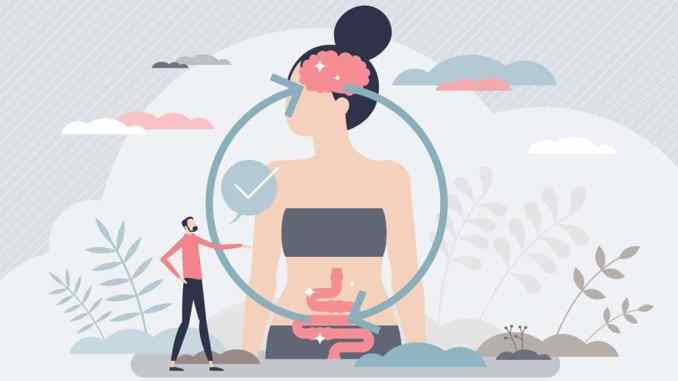
In Ayurveda, agni means fire and this inner fire is critically important to our health. Our main digestive fire in our gut governs our ability to digest and process foods and toxins, as well as process our emotions and experiences. Agni supports so many facets of our physical and mental health, that when it is impaired or out of balance, it causes ama (a Sanskrit term meaning something undigested or a toxin) to be formed and accumulated in our mind and body, which can lead to mental and physical disease.
The Mind-Gut As One
To resolve either issue—mental or digestive—you need to address both the mind and the gut simultaneously. When you have toxins in your gut, it shows up in your thought patterns, which can lead to conditions such as anxiety, anger or depression. And when you have chronic negative thought patterns, it influences your gut health, which can show up as IBS, gastric reflux or constipation.
Modern medicine is just beginning to grasp this concept, most notably in the research on the impact the gut microbiome has on our mood. The term gut-brain connection is often used to explain the intricate relationship between the digestive system and the brain, but this language is limiting because of the assumption that the gut and brain are two different functional parts. In reality, the gut and brain are one functional unit.
So, what are some Ayurvedic strategies for maintaining a healthy gut and balanced mood? Here are some of my favorite basics:
Practice Intermittent Fasting
The reason that intermittent fasting is so important is because your gut needs a break to stay efficient, and your body detoxes and repairs overnight. If your digestive tract is working overtime during the night, your body won’t detoxify and regenerate as effectively because it’s too busy trying to digest your midnight snack.
Fasting during the hours that the sun goes down honors your circadian rhythms. This automatically generates more energy and greater mental clarity, allowing you to jump out of bed feeling fresh and vibrant each morning.
For those who live in a time zone where the sun sets really early during certain times of the year, simply don’t eat after 6 p.m. This will generally give you at least 12 hours of fasting. As you get older, your fasting time should become longer—aiming for 15 hours is best after the age of 40.
Eat in a Mindful Manner
Mindful eating means eating without distractions (TV, electronics and even talking). These distractions actually pull energy away from the process of digestion and bring it up to the brain for “digesting” all of the information you’re feeding your mind. Eating in a quiet, settled environment and taking 30 seconds of silence before starting your meal helps your mind shift gears so it can rest, relax and digest.
Your brain receives signals from your senses to help it prepare your gut to properly digest your food—this includes the sound, touch, sight, smell and taste of your food. We try to eat with our hands as much as possible when at home to provide the sense of touch—this is a common practice in India. When you’re distracted, your brain doesn’t get any of this important sensory information so it not only doesn’t prepare your gut for the meal, it also converts digestive energy to mental energy. This leads to overeating, malabsorption and indigestion because your gut is shut down.
Cook With Spices
Spices help you digest your food. Adding spices can turn your meal into nature’s delicious pharmacy, enabling your food to heal you from the inside out. In fact, many ancient spices are being studied for treating chronic conditions like arthritis, dementia, IBS and asthma.
Three spices that I eat daily are cumin, turmeric and ginger:
- Cumin is one of the best spices for supporting digestion and gently removing toxins from the body. It also helps to reduce inflammation and pain in the uterus and reduces tightness in the lungs. One of the best ways to get the benefits of cumin is by using it in your cooking. I prepare most of my meals by first sautéing cumin seed, fennel seeds, mustard seeds and fresh ginger in some ghee. Then I add ½ to 1 teaspoon of cumin powder, coriander powder and turmeric powder to create a healing and restorative paste that is used as the foundation for most of my meals.
- Turmeric is a “super food” in Ayurveda. It is a potent antioxidant, antiseptic and anti-inflammatory that has been studied in relation to several conditions including cancer, wound healing, arthritis and Alzheimer’s disease. Its uses in Ayurveda are too vast to list, but include the treatment of uterine fibroids, cysts and menstrual issues. Turmeric can also help with a multitude of skin conditions including psoriasis, acne and eczema, as well as intestinal infections, conjunctivitis, liver conditions and asthma. As a child, I grew up using a combination of turmeric and honey for respiratory infections.
- Ginger has been used for thousands of years in India for many different ailments, plus it’s a popular ingredient in everyday cooking. It’s even added to chai tea to help counteract the effects of caffeine. Ginger is not only favored in India—it’s recognized as an effective home remedy by many other cultures around the world. Ginger has been tested and researched by the medical community and most of ginger’s traditional uses have been proven to be effective. Studies show ginger as an effective digestive aid, anti-inflammatory and immune booster. Ginger is also being studied for the treatment of colon and ovarian cancer.
Gut and brain health begin in the kitchen and when they both function harmoniously as one unit, you begin to unlock the secrets to longevity. As you manage both gut and brain health simultaneously, you are bringing into balance the two most important systems in the body, which govern your entire health landscape. But when you only address one system—either the gut or the brain—you can spend years traveling down a singular path with only partial improvement because the other functional part of the unit has been ignored.


Leave a Reply